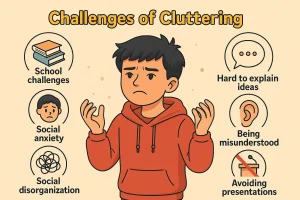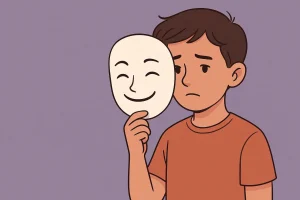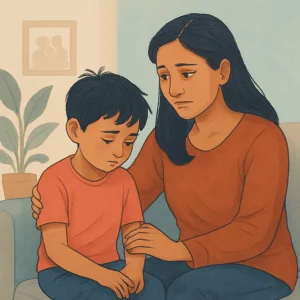Is Marriage Counseling Worth It When Love Fades?
By Prapoorna M
Last Updated: February 8, 2025
Marriage counseling is a topic that often comes up when couples face challenges in their relationship. But what happens when the love seems to have faded? Is it still worth trying marriage counseling? This is a question many couples grapple with, especially when they feel disconnected from their spouse.
The idea of seeking help when the emotional bond has weakened can feel daunting. You might wonder if it’s possible to rekindle the love or if the effort will be in vain. These are valid concerns and understanding the potential benefits of marriage counseling in such situations is crucial.
Book Your Marriage Counselling Now
Understanding the Situation
Common Reasons Why Spouses Fall Out of Love
Falling out of love is a painful experience, and it often happens gradually. Many factors can contribute to this disconnect. Over time, life’s pressures such as work, children, and financial stress can take a toll on the relationship. Communication breakdowns are another significant factor; when couples stop talking or only discuss mundane tasks, emotional intimacy can wane.
Sometimes, unresolved conflicts and past hurts create walls between partners. If issues aren’t addressed, resentment builds, making it harder to maintain a loving connection. Additionally, personal changes and growth can cause partners to drift apart if they aren’t growing together.
Typical Challenges Faced in Loveless Marriages
Loveless marriages present unique challenges. Without emotional intimacy, couples often feel lonely and isolated, even when they are together. This loneliness can lead to depression and anxiety. There’s also the challenge of maintaining physical intimacy, which often suffers when emotional bonds are weak.
Moreover, a lack of love can lead to practical issues. Decision-making, co-parenting, and managing household responsibilities can become contentious and stressful without a foundation of mutual respect and affection. Trust issues might also arise, making cooperation and understanding difficult.
The Role of Marriage Counseling
What Marriage Counseling Is and How It Works
Marriage counseling, also known as couples therapy, is a type of psychotherapy that helps couples understand and resolve conflicts to improve their relationship. During counseling sessions, a licensed therapist works with both partners to discuss their issues and feelings in a safe and structured environment.
The process usually begins with the therapist understanding the couple’s history and the issues they are facing. Through guided discussions, the therapist helps the couple communicate more effectively, identify and address underlying problems, and develop healthy ways to manage conflicts.
Benefits of Marriage Counseling Even in Difficult Situations
Marriage counseling offers numerous benefits, even when the relationship seems strained or the love appears to have faded. One significant benefit is improved communication. Many couples struggle to express their feelings and needs, leading to misunderstandings and resentment. Counseling provides tools and techniques to enhance communication, fostering a better understanding between partners.
Another benefit is conflict resolution. A therapist can help couples learn how to handle disagreements constructively, reducing the frequency and intensity of arguments. This is crucial for maintaining a peaceful and supportive home environment.
Potential for Rekindling Feelings and Improving the Relationship
One of the most hopeful aspects of marriage counseling is its potential to rekindle feelings and improve the relationship. While it may seem daunting to rebuild love, many couples find that, through counseling, they can reconnect on a deeper level. By addressing and resolving past hurts, they can pave the way for renewed affection and understanding.
Therapists often use various techniques to help couples rediscover the positive aspects of their relationship and rebuild emotional intimacy. This might include exercises to improve communication, strategies to spend quality time together, and methods to show appreciation and gratitude.
Steps in Marriage Counseling
| Step | Description |
|---|---|
| Initial Assessment | The therapist meets with the couple to understand their history, issues, and dynamics. This step involves gathering background information and identifying the main problems affecting the relationship. |
| Goal Setting | Couples work with the therapist to set specific, achievable goals for what they want to accomplish through counseling. This may include improving communication, resolving conflicts, rebuilding trust, or other personalized objectives. |
| Therapy Sessions | Regularly scheduled sessions where the couple meets with the therapist to discuss their issues, practice new communication techniques, and work on resolving conflicts. These sessions provide a safe space for open dialogue and problem-solving. |
| Homework/Exercises | Couples are given assignments or exercises to complete outside of therapy sessions. These activities are designed to reinforce what is learned during sessions and encourage the application of new skills in everyday life. |
| Progress Evaluation | Periodic reviews conducted by the therapist to assess the couple’s progress towards their goals. During these evaluations, strategies may be adjusted, and new. |
Reasons to Consider Marriage Counseling
Marriage counseling offers numerous benefits, especially in challenging situations where love seems to have faded. Here are some compelling reasons to consider marriage counseling, even if your relationship feels distant.
To Understand Underlying Issues
One of the primary benefits of marriage counseling is its ability to uncover deep-seated issues that might have led to the loss of love. Often, problems in a marriage stem from unresolved conflicts, past traumas, or unmet needs that have built up over time. In a safe and structured environment, a therapist can help both partners identify these underlying issues.
Understanding these root causes is crucial because it allows couples to address the real problems rather than just the symptoms. By working through these issues, couples can gain a deeper understanding of each other and what has caused the emotional distance. This insight is a key step in rebuilding the relationship.
Improve Communication
Effective communication is the cornerstone of any healthy relationship. Marriage counseling provides tools and techniques for better communication, helping couples express their thoughts and feelings more clearly and listen to each other more effectively.
Does marriage counseling help if you don’t love your spouse? Absolutely. Even if love seems lost, improved communication can bridge the gap. It allows partners to reconnect emotionally and understand each other’s perspectives, which can be the first step toward rebuilding the relationship.
Rebuild Trust and Intimacy
Trust and intimacy are vital components of a loving relationship. Over time, various factors can erode these elements, leading to a loveless marriage. Marriage counseling explores ways to rebuild trust and intimacy, helping couples reconnect on a deeper level.
Counseling sessions can include exercises and activities designed to strengthen the bond between partners. Therapists may guide couples through trust-building exercises and encourage them to spend quality time together, fostering a renewed sense of closeness and affection.
Assessing the Future of the Relationship
Another critical aspect of marriage counseling is helping couples assess the future of their relationship. Counseling provides a neutral space where both partners can explore their feelings and intentions honestly. This can help determine whether the marriage is salvageable or if it might be healthier to part ways.
Can marriage counseling save a loveless marriage? While there’s no guarantee, counseling can provide clarity and guidance. It helps couples understand their relationship dynamics and make informed decisions about their future.
Practical Tips for Success in Marriage Counseling
Making the most out of marriage counseling requires commitment, open-mindedness, and active participation from both partners. Here are some practical tips to help you achieve success in your relationship counseling journey.
Being Open and Honest
One of the most crucial aspects of effective marriage counseling is being open and honest during sessions. It’s essential to express your true feelings and thoughts without fear of judgment. Transparency allows the therapist to understand the root causes of your issues and offer the most effective guidance.
Remember, the goal of relationship counseling is to improve your relationship, and honesty is the foundation of that process. By sharing your experiences and emotions openly, you create an environment where real progress can be made.
Setting Realistic Expectations
It’s important to understand that change takes time. Setting realistic expectations about what marriage counseling can achieve is vital for maintaining a positive outlook. Relationship therapy is not a quick fix; it involves continuous effort and patience from both partners.
Progress may be gradual, and there might be setbacks along the way. However, staying committed to the process and being patient with each other can lead to meaningful and lasting improvements in your relationship.
Participating Actively
For marriage counseling to be effective, both partners need to actively participate. This means attending all sessions, engaging in discussions, and completing any exercises or homework assigned by the therapist. Active participation shows your commitment to improving the relationship and ensures that both voices are heard and considered.
Marriage counseling for couples who have fallen out of love can be particularly challenging, but it also offers an opportunity to reconnect and rebuild your relationship. By being fully involved in the counseling process, you maximize the chances of finding solutions that work for both of you.
Additional Tips
- Commit to the Process: Make a firm commitment to attend all sessions and be fully present during them. Consistency is key to making progress.
- Stay Open-Minded: Be willing to listen to your partner’s perspective and consider different approaches suggested by the therapist. Flexibility can lead to new insights and solutions.
- Seek Qualified Professionals: Ensure that you are working with a licensed and experienced therapist. A qualified professional can provide the guidance and support needed to navigate complex relationship issues effectively.
Traditional vs. Online Marriage Counseling
| Feature | Traditional Counseling | Online Counseling |
|---|---|---|
| Accessibility | Requires physical attendance at a specific location | Accessible from anywhere with an internet connection |
| Convenience | Typically follows a fixed schedule, requiring travel and time | Offers flexible scheduling, fitting into your daily routine |
| Comfort | Sessions may feel intimidating or uncomfortable for some in a clinical setting | Conducted in the comfort of your home, reducing anxiety |
| Privacy | May have privacy concerns with others knowing you attend therapy | Utilizes private and secure online platforms for confidentiality |
| Cost | Can be more expensive due to overhead costs of maintaining a physical office | Often more affordable with reduced overhead expenses |
| Effectiveness | Equally effective if both partners are committed and actively participate | Equally effective if both partners are committed and actively participate |
Conclusion
Marriage counseling can be a valuable tool for couples facing difficulties, even when love seems to have faded. Throughout this article, we’ve explored why spouses fall out of love, the challenges in loveless marriages, and how marriage counseling can help. By improving communication, rebuilding trust, and addressing deep-seated issues, counseling offers a chance to reconnect and understand each other better. Even if you’re feeling hopeless, seeking professional help can provide clarity on whether your marriage can be saved.
If you’re considering marriage counseling, remember that taking this step is a positive move towards healing and understanding. At Wellness Hub, we offer a range of marriage counseling services designed to support you. Whether you opt for traditional counseling, online sessions, or individual therapy, the key is to stay open and committed to making positive changes. Don’t hesitate to explore your options and find the support you need to navigate these challenging times.
Frequently Asked Questions:
1. What is marriage counseling and how does it work?
Marriage counseling, also known as couples therapy, is a type of psychotherapy that helps couples understand and resolve conflicts to improve their relationship. A licensed therapist works with both partners to discuss their issues and feelings in a safe and structured environment, providing tools and techniques to enhance communication and resolve conflicts.
2. Is it worth trying marriage counseling if you no longer love your spouse?
Yes, it is worth trying marriage counseling even if you no longer love your spouse. Counseling can uncover underlying issues, improve communication, rebuild trust, and help both partners assess the future of their relationship. It offers a chance to reconnect and potentially rekindle feelings.
3. What are the benefits of marriage counseling in a loveless marriage?
Marriage counseling offers several benefits in a loveless marriage, including improved communication, conflict resolution, emotional support, and strategies to rebuild trust and intimacy. It provides a safe space to address deep-seated issues and explore the potential for renewing the relationship.
4. Can couples therapy work if there’s no love?
Yes, couples therapy can work even if there’s no love. It helps identify and address the root causes of the emotional disconnect, providing tools and strategies to improve the relationship. Many couples find that therapy helps them reconnect and rebuild their bond.
5. What are common concerns about attending marriage counseling?
Common concerns about attending marriage counseling include fear of confrontation, feelings of hopelessness, and the stigma that therapy is only for “crazy people.” Addressing these concerns openly can help couples feel more comfortable seeking help.
6. How can I make the most out of marriage counseling?
To make the most out of marriage counseling, be open and honest during sessions, set realistic expectations, and actively participate. Commitment and open-mindedness are crucial for effective therapy. Seeking help from qualified professionals also ensures you get the best support.
7. Are there alternatives to traditional marriage counseling?
Yes, there are alternatives to traditional marriage counseling, such as online counseling and individual therapy. Online counseling offers flexibility and convenience, while individual therapy allows you to work on personal issues that impact your relationship. Both approaches can be effective in improving your marriage.
8. How does online marriage counseling work?
Online marriage counseling provides the benefits of traditional counseling with added accessibility and convenience. Sessions are conducted via video calls, allowing couples to attend from the comfort of their home. This format can encourage openness and make it easier to fit counseling into busy schedules.
9. Can individual therapy help improve my marriage?
Yes, individual therapy can help improve your marriage by allowing you to explore your feelings, behaviors, and patterns in depth. Understanding personal issues can lead to more constructive interactions with your spouse, contributing to a healthier relationship dynamic.
10. Where can I find qualified marriage counselors?
You can find qualified marriage counselors at reputable therapy centers and online platforms. At Wellness Hub, we offer a range of marriage counseling services with experienced therapists dedicated to helping couples overcome their challenges.
About the Author:
Prapoorna Mangalampalli
M.Sc., M.A., (Dual Masters in Psychology & English) – Counselor (6+ years of experience)
Prapoorna is a skilled counselor with dual Master’s degrees in Psychology and English. With more than six years of professional experience, she specializes in providing various types of counseling, including online Therapy , Marital , Relationship, child, family, and career counseling. Prapoorna is part of the Wellness Hub team, where she contributes significantly to their mission. She values a team-based approach and is committed to innovation, compassion, and the success of her clients. Her diverse educational background and extensive experience enable her to offer insightful and effective counseling services that positively impact individuals and families.
Book your Free Consultation Today
Parent/Caregiver Info:
Client’s Details:
* Error Message









